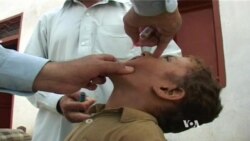Pakistan is losing ground in the battle against polio, with the country suffering its worst outbreaks in more than a decade.
Efforts to erase polio are hampered by suspicions that health workers are spies, following the CIA's use of a vaccination team to track Osama bin Laden. That legacy led to two polio workers being killed Wednesday.
Since December of 2012, militants have killed several dozen health workers involved with the Pakistan vaccination program and the police officers escorting them.
False information
However, suspicions about the vaccine itself are also proving to be an obstacle. A recent push to vaccinate Pakistani children against polio saw health workers not just combatting a disease, but also false information.
"People say that it's not good, it's not right. They say there is something in this vaccine - that there is swine used in the vaccine. And some say that it takes your manhood away. It makes you impotent," said one male resident of Shabqadar.
Wiped out in other countries, polio is making a comeback in Pakistan, with more than 200 cases so far this year.
A village in Shabqadar is one of several targets in the government's plan to vaccinate every child under the age of five. But the program has been disrupted by regional violence, displacement and increasingly, suspicions like these.
"There is hate for this vaccine. Mullahs have issued 20 different statements. They say that it's an anti-Muslim campaign," said Jamil Khan, a Shabqadar resident. "It stops young boys from being able to produce several offspring when they are men. It limits them to only being able to produce one or two children.
"When they grow up, they lose their manhood and sexual urge. Britain and America are responsible for this," he added, citing rumors in the area.
Vaccination drive
Frustration that such misinformation has led children to fall sick has led government workers to try to counter the rumors during a recent three-day vaccination drive.
"We go from village to village, house-to-house, and door-to-door, giving polio drops to those children whose parents initially refused," said Arshad Khan, a vaccination worker. "Sometimes we bring them [an influential elder, like] a Khan, Nazim or Malik, or even try ourselves to ensure that all the children are covered."
But while health workers battle misinformation, polio continues to flourish, raising the risk of its moving beyond Pakistan's borders.





